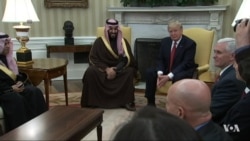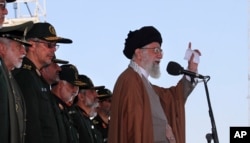Saudi Crown Prince Mohammed bin Salman likened Iran's supreme leader to Adolf Hitler and said Saudi Arabia will quickly develop a nuclear bomb if Iran does the same.
"Saudi Arabia does not want to acquire any nuclear bomb, but without a doubt if Iran developed a nuclear bomb, we will follow suit as soon as possible," Prince Mohammed said in an interview scheduled to air this Sunday on CBS's 60 Minutes.
WATCH: Trump to Roll Out Red Carpet for Saudi Crown Prince
Congressional reaction to the Saudi's conditional willingness to build a nuclear bomb was predictably mixed along party lines, with Democratic Senator Bill Nelson agreeing Iran's development of such a weapon would lead to their proliferation in the region.
"I think you would start to see a bunch of the Gulf states use their wealth to develop a nuclear weapon. And that’s why it’s all the more important that Iran not develop a nuclear weapon, and that’s all the more reason to keep the nuclear agreement in place, because it guarantees — unless Iran breaks the agreement — for another 10-12 years that they will not have a nuclear weapon … Once you get these other [Middle Eastern] nations with nuclear weapons, that gets to be a highly risky, very destabilized situation."
U.S. President Donald Trump has said he would not recertify the 2015 agreement between Iran, the U.S. and five other world powers, maintaining it was too lenient and that Iran had violated parts of the deal, including allowing access to international inspectors. The initial structure lifted stringent economic sanctions on Iran in exchange for limitations on the country's nuclear energy program, which global powers feared Iran would leverage to develop a nuclear weapon.
"We’ve got a president now that’s going to deal with the Iran crisis a little bit different, and the world knows it," said Republican Senator David Perdue. "You’ve seen Congress put more sanctions on Iran because of their nefarious activities. So we’re taking a unified approach to Iran. The rest of the world is backing us up so far, and I think we are going to see more of that under the new secretary of state."
When asked if other regional non-nuclear nations would be encouraged to develop nuclear weapons if the agreement is not renewed, Perdue responded, "I really don’t think so. There’s a historic line in the sand about nuclear proliferation."
In a preview of the interview released Thursday, the 32-year-old heir to the Saudi throne also said Iranian Supreme Leader Ayatollah Ali Khamenei's comportment is similar to Hitler's during the rise of Nazi Germany.
"He wants to create his own project in the Middle East very much like Hitler who wanted to expand at the time. Many countries around the world and in Europe did not realize how dangerous Hitler was until what happened, happened. I don't want to see the same events happening in the Middle East," he said.
When asked if Saudi Arabia's centuries-old rivalry with Iran is a factor in the current rift between the two countries, Prince Mohammed said, "Iran is not a rival to Saudi Arabia. Its army is not among the top five armies in the Muslim world. The Saudi economy is larger than the Iranian economy. Iran is far from being equal to Saudi Arabia."
Saudi Arabia, governed by a Sunni monarch, has accused Iran of financing militia operations to weaken Arab states. Iran, a Shi’ite theocracy, has denounced the Saudis for supporting Sunni militant groups. Their attempts to dominate the region has placed them on opposite sides of conflicts in Iraq, Syria and Yemen that have claimed the lives of hundreds of thousands of people and forced the displacement of millions of others.
VOA's Michael Bowman contributed to this report.








